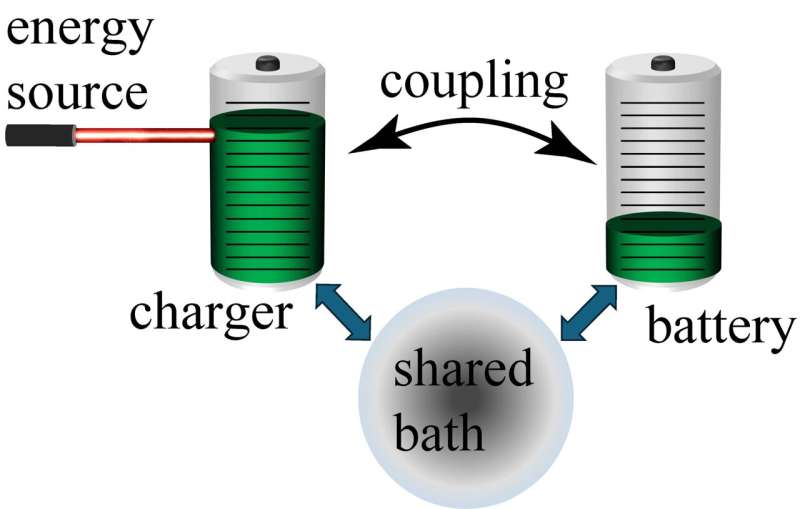June 8, 2024 feature
This article has been reviewed according to Science X's editorial process and policies. Editors have highlighted the following attributes while ensuring the content's credibility:
fact-checked
peer-reviewed publication
trusted source
proofread
Nonreciprocal quantum batteries exhibit remarkable capacities and efficiency

In physics, nonreciprocity occurs when a system's response varies depending on the direction in which waves or signals are propagating within it. This asymmetry arises from a break in so-called time-reversal symmetry, which essentially means that a system's processes observed as they evolve over time will be different compared to those processes observed on rewind.
Nonreciprocity is commonly leveraged when developing new quantum technologies, for instance, to enable the flow of signals in a specific direction and to suppress noise. So far, however, it had rarely been applied to the development of quantum energy storage solutions.
Researchers at University of Gdansk in Poland and University of Calgary in Canada recently explored the possibility of using nonreciprocity to optimize the charging dynamics of quantum batteries. Their paper, published in Physical Review Letters, introduces new nonreciprocal quantum batteries that perform remarkably well, both in terms of energy capacity and efficiency.
"Our recent paper emerged from our ongoing exploration of nonreciprocity and its applications in quantum technologies," Assistant Professor Shabir Barzanjeh, co-author of the paper, told Phys.org.
"The foundational idea was inspired by the inherent advantages of nonreciprocal systems in directional signal flow and noise suppression, which are crucial in quantum information and computing. We aimed to extend these benefits to the realm of quantum batteries, particularly focusing on optimizing energy storage and charging dynamics."
The primary objective of the study by Barzanjeh and his colleagues was to successfully use nonreciprocity to improve the efficiency and capacity of quantum batteries, potentially leading to innovations in how quantum technologies store energy.
The batteries they designed leverage the breaking of time-reversal symmetry to create a direct flow of energy from a quantum charger to the battery, preventing energy backflow.
"This is achieved through reservoir engineering, where a dissipative environment, like an auxiliary waveguide, facilitates effective energy transfer," Barzanjeh explained.
"The nonreciprocal setup enhances energy accumulation by using an interference-like process that balances dissipative interactions with coherent ones. This approach significantly increases stored energy, even in overdamped coupling regimes, and is straightforward to implement using current quantum circuits in photonics and superconducting systems."
The researchers assessed the performance of their nonreciprocal quantum batteries by running a series of calculations and attained highly promising results. In fact, they found that their nonreciprocal design led to a fourfold enhancement in energy storage efficiency compared to conventional quantum batteries.
"Our findings demonstrate that nonreciprocal quantum batteries can effectively overcome local dissipation and maintain high energy transfer rates," Barzanjeh said. "The practical implications are extensive, potentially revolutionizing energy storage in quantum technologies, enabling more efficient quantum sensing, energy capture, and even advancing the study of quantum thermodynamics."
The recent work by this research team opens new exciting avenues for the use of nonreciprocity to enhance the performance and reliability of both quantum batteries and other quantum systems.
In their next studies, Barzanjeh and his colleagues plan to continue assessing the potential of nonreciprocal quantum batteries, while also optimizing their design and integrating their batteries into larger quantum systems.
"We now aim to investigate the interplay between nonreciprocity and other quantum resources, such as entanglement and quantum catalysis, to boost energy storage capabilities further," Barzanjeh added.
"Additionally, we plan to experimentally implement our theoretical models in practical quantum circuits, validating our findings and refining the technology for real-world applications. This includes exploring the chiral and topological properties of systems featuring lossy coupling, which could lead to new breakthroughs in quantum information processing and energy storage."
More information: B. Ahmadi et al, Nonreciprocal Quantum Batteries, Physical Review Letters (2024). DOI: 10.1103/PhysRevLett.132.210402. On arXiv: DOI: 10.48550/arxiv.2401.05090
Journal information: Physical Review Letters , arXiv
© 2024 Science X Network





















